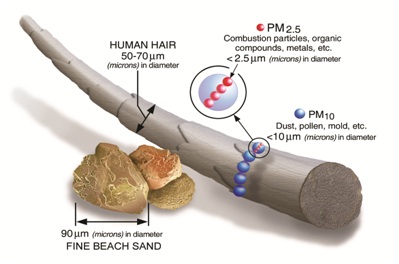Context
India recorded 867,000 deaths in 2017 due to exposure to fine particulate matter (PM2.5) — the second-highest in the world, according to a new report.
What is Particulate Matter 2.5 (PM2.5)?
Particulate Matter (PM)
- Airborne particulate matter (PM) is not a single pollutant, but rather is a mixture of many chemical species.
- Particles are defined by their diameter for air quality regulatory purposes.
|
- Particulate matter 2.5 (PM2.5), refers to tiny particles or droplets in the air that are two and one half microns or less in width.
- The widths of the larger particles in the PM2.5 size range would be about thirty times smaller than that of a human hair.
- The smaller particles are so small that several thousand of them could fit on the period at the end of this sentence.

Key-highlights of the Study
- China topped the list with 1,387,000 deaths.
- Indonesia came third, recording 94,000 deaths, followed by Egypt 88,000, Pakistan 86,000, Russian Federation 68,000, Bangladesh 64,000, Nigeria 51,000 and the United States 47,000.
- In India, the top four of the 200 areas with the highest PM2.5 concentrations — Singrauli, Kanpur, Sitapur and Ahmedabad — all experienced increase in population-weighted mean (PWM) for PM2.5 mass between 1970 and 2017 (the study period).
- The PWM for these places were 14-16 times the annual average advocated in World Health Organization guidelines.
The Study
- The study Global Burden of Disease from Major Air Pollution Sources: A Global Approach by Health Effects Institute (HEI), an independent, non-profit research institute was published December 15, 2021.
- It analysed data on air pollution and mortality from 1970-2017.
|
